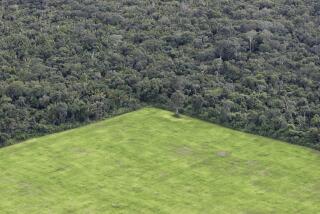A Defender for the Press in Latin America
- Share via
SANTIAGO, Chile — If a new advocate for press freedom in the Americas lives up to the hope and rhetoric, Latin Americans will have a staunch guardian against a sinister crime wave: attacks on journalists.
In 1997, 10 Latin American journalists were killed for doing their jobs, a tenfold increase over the previous year and almost half the toll worldwide.
By the end of this year, the Organization of American States is to designate a special advocate, ideally a respected figure with media experience, who will respond rapidly to investigate crimes against journalists. The idea is to add a strong new voice to the international public outcry that serves as one of the few shields for journalists who are targeted for doing their job.
Urged on by journalists and defenders of the press at last week’s Summit of the Americas here, leaders of the hemisphere’s 34 democracies authorized creation of the advocate post, known as a special rapporteur, who will work for the human rights commission of the OAS.
President Clinton put press freedom high on the summit agenda, pledging $300,000 for the post. The U.S. hopes that others throughout the Americas will also contribute; funding is voluntary because a fundamental premise is that the advocate should be independent.
“It’s crucial that this new position be independent of governments at the same time that governments should support it and cooperate,” said Sidney Blumenthal, a special assistant to Clinton.
Defending the Latin American press is fundamental to the “second generation” of reforms that leaders pledged to fortify their fledgling democracies.
Journalists inevitably find themselves denouncing powerful and corrupt interests, fighting on turf that ineffective police and prosecutors have ceded.
“This gives journalists in certain parts of Latin America an importance that goes far beyond that of journalists in more consolidated democracies,” said Gustavo Gorriti, a Peruvian whose investigative work in Peru and Panama has brought retaliation from both governments. “But this means that the risk increases in proportion to the importance.”
Gorriti and other top Latin American journalists reviewed the casualty list and its causes at a forum on press freedom during the summit. The forum was delayed for several hours because of events held by the presidents of Paraguay and Chile, who unceremoniously muscled into an auditorium rented by the journalists. The slight was viewed as symbolic.
“This shows that the presidents’ deeds clash with their words,” growled Horacio Verbitsky, one of Argentina’s most prominent columnists.
Despite their celebration of democracy last week, most Latin American leaders seem unenthusiastic about doing away with archaic laws that can imprison authors of even accurate press exposes and give public officials special protection from scrutiny.
Journalists at the forum singled out Peru, Mexico and Colombia as particularly unable or unwilling to stop systematic harassment of and violence against their colleagues. The murder of photographer Jose Luis Cabezas in Argentina and the machine-gun attack that severely wounded editor Jesus Blancornelas in Tijuana sparked outrage across the Americas last year. Neither case has been solved.
The success of the press advocate will depend largely on who is chosen for the task and what kind of power the individual is granted, observers said. Even in the best of cases, it will be the same kind of formidable, but fragile, power that many Latin American journalists exert today: moral authority.
More to Read
Sign up for Essential California
The most important California stories and recommendations in your inbox every morning.
You may occasionally receive promotional content from the Los Angeles Times.










